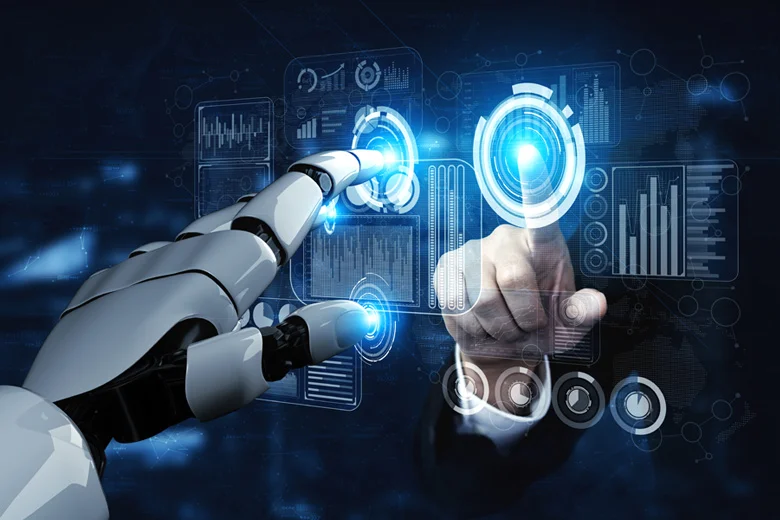
n a captivating conversation with Dr. Santanu Paul, Founder and CEO, TalentSprint, Dr. Ashish Mehra, Mentor, Product and GTM, IIT Startups, and Investor and Advisor at Tau Ventures points out the fine balance artificial intelligence (AI) is bringing to drive innovation in the products and boost profitability.
According to the International Data Corporation (IDC), the worldwide revenues for the artificial intelligence (AI) market, including software, hardware, and services, are forecast to grow 16.4% year over year in 2021 to $327.5 billion. By 2024, the market is expected to break the $500 billion mark with a five-year compound annual growth rate (CAGR) of 17.5% and total revenues reaching a staggering $554.3 billion.
One in ten enterprises now uses ten or more AI applications with chatbots, process optimization and fraud analysis leading all categories, says MMC Ventures’ The State of AI Divergence Study.
A recent Salesforce Research report, Enterprise Technology Trends, found that 83% of IT leaders say artificial intelligence (AI) and machine learning (ML) are transforming customer engagement and 69% say it is transforming their business.
Naturally, the demand for AI products is on a rapid rise.
AI is the ‘new electricity, and data is a ‘new fuel.’ AI, machine learning, and cyber security are at the top of everyone’s minds, and companies continue to invest heavily in these technologies. Financial services, banks, fraud detection risk management, insurance claims to have a rapid AI adoption, and they are showing value. Likewise, in healthcare too, there is a massive demand for AI technology.
In the 11th episode of DeepTalk, Dr. Ashish Mehra, Mentor, Product and GTM at IIT Startups and Investor and Advisor at Tau Ventures, pointed out the fine balance AI is bringing to drive innovation in the products and boost profitability.
In this captivating conversation with Dr. Santanu Paul, Founder and CEO, TalentSprint, Dr. Ashish Mehra answered several intriguing questions.
- Where does deep learning shine in the world of unstructured data?
- How can AI be used in flow and activity detection?
- What is the tolerance of errors in AI?
- How is AI used in defect prevention and detection?
- How is AI helping manufacturers make their journey faster and effective?
- What are the current and future trends in NLP?… and many more
Here are the excerpts from the webinar.
Become master of the craft with artificial intelligence (AI)
AI software is probabilistic, unlike traditional software. AI systems are built to minimize the cost of errors, and hence, this technology is now widely used in manufacturing. For a manufacturing company, the three pillars are availability, performance, and quality. To have the quality of the products, AI is used in detecting defect inspection, defect detection, and defect prevention. Even with slight improvements in the overall efficiency, it results in cost savings for the companies.
AI is augmenting and helping manufacturing companies to make processes and decision-making effective and rapid. AI technology aids in better quality and makes factory professionals more productive with automation training. By acquiring knowledge, factory professionals can easily foresee problems and make sense of data for better decision-making.
Communication is lifeblood
Conversational AI is a technology and science behind automated messaging and speech-enabled applications. Today, most interactions occur through AI in the digital world. It offers human-like interactions between humans and computers. Optimizing those interactions results in engagement. Interactions and engagement with talented staff, customers, and products have natural language at its core, and for that, conversational AI is at its highest quality in the modern era.
Big picture of natural language processing (NLP)
In the world of enterprise AI, natural language processing (NLP) is in great demand. The major four areas where NLP is making a dent are a general area of customer management, interaction with customers to improve their experience, anticipating problems, and then finding a solution. Companies, right from healthcare to life sciences, banking, and financial services are investing heavily in NLP. In the digital world, primary interaction with customers and businesses starts and ends with NLP touchpoints. AI generates natural language, and this cutting-edge technology is a crucial yet delicate balancing act now permeating into every bit of our existence.
Cold start problem for startups
While building new AI products, strategies are needed. Sometimes, AI needs the data to start the work. There are different strategies that startups use to gather data while building new products. Creating new products depends on the data acquisition and cleaning it as per the context of the domain. Supervised learning algorithms label this enriched data. With time, new data comes in, and the data quality and model quality may pose some issues. So, it is crucial to understand that the value of the business and AI depends on the cleanliness of the data. For that, professionals need to have a basic understanding and knowledge of the domain. To avoid these cold start problems in startups, Dr. Ashish Mehra advises professionals to become domain experts or work with domain experts.
In such a fast-growing worldwide AI industry, there are promising opportunities for professionals and entrepreneurs with relevant capabilities. IIIT Hyderabad and TalentSprint’s AI and Machine Learning program is designed to help them build such capabilities.
 India
India  USA
USA 

